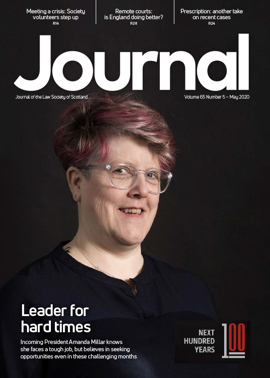As the pounds decline, the penny drops

”When the tide goes out, you see who’s wearing shorts and who isn’t.” (Warren Buffett)
“Depend upon it, sir,” said Dr Samuel Johnson, “when a man knows he is to be hanged in a fortnight, it concentrates his mind wonderfully.” COVID-19 has focused our minds on survival as not since World War 2. It is transforming our understanding of business resilience. The root of resilience is cash, but for many law firms it is an Achilles heel.
Recently, the software company BigHand surveyed 275 finance professionals in US and UK law firms of more than 100 lawyers. It found that 37% of UK firms underpriced, while 32% scoped poorly, and did not use the right level of resource. To stop profits leaking, 46% of UK firms planned to train lawyers in pricing practices, while 35% said they would take steps to improve time recording.
Training may be necessary, but is it sufficient? Don’t 100-plus lawyer firms – and for that matter most smaller firms – already know in principle what they should be doing? It’s not knowledge, but a cultural deficit that explains the gap between principle and practice. For that to change, three elements must be in place: consensus that change is needed; lawyers who are confident in the value they deliver; and a system of measurement, appraisal, reward and recognition which creates accountability, incentivises best practice and bears down on tardiness. Such is the task of leadership.
Going Dutch
For a different approach to these matters, let me take you to Amsterdam. I once attended an IBA conference there (remember conferences?) which included a session on managing cash. We were addressed by a US lawyer and CEO, whose spectacles and personality had the same steely glint. Asked by the moderator how his firm ensured that bills were rendered and cash collected on time, he said it was very simple: if monthly targets for cash in were not met, partners were not paid their drawings. There was a notable frisson round the room. Eyes widened. Bums squeaked. “How,” asked the moderator, “do you enforce that?” “Simple,” replied our speaker, with a thin smile. “We never have to.”
Later, I had a conversation with the regional managing partner of a Big Four accountancy practice, and the same subject came up. His firm has a system where each team pledges to ingather a minimum amount of cash each quarter, and if it is not collected, the local board are not paid their quarterly bonus. Nobody wants to be the miserable wretch who has cost the board a payday, and so, as with our US friend, the situation arises once in the bluest of moons.
Turning crisis to advantage
When I discuss methods like these with clients, their most frequent objection is that it’s too drastic, and not collegiate. You have to take the rough with the smooth. The argument has some force. Life happens, as is only too apparent. It’s possible to do the right things, and still be ambushed by events. I’m all for supporting good colleagues through tough times. But on the other hand, what is collegiate about scoping poorly, under-recording time, billing late, being tardy about collection and leaking profit, while still collecting your monthly envelope? It is the opposite of collegiate.
A G Lafley, the CEO who transformed Procter & Gamble, once said there was no point in being in business if you did not play to win. He wasn’t advocating that the end justifies any means: simply that without a winning mentality, a business is doomed to being either an also-ran, or extinct. There are different ways of measuring business success, but all others pale in comparison to success at the bank.
Every firm is different, and leaders must make a judgment on the right regime for them. In a profession which defends personal autonomy like the NRA defends the right to bear arms, there is often a gap between what managing partners would like to do, and what they feel they can do. One of the few upsides of this ghastly virus is that it has created a climate in which permanent change can be more easily accomplished. Even when things loosen up, making money will be tough, with activity reduced, and battered clients demanding easier terms. Lowballing will abound. The threat to incomes and jobs means there will never be a more opportune time to get buy-in for fresh policies, better systems, new ways of evaluating partners and staff, to nudge (or in some cases elbow) them into raising their game. In such an environment, there may indeed be a valuable place for training.
We think of ourselves as being at war just now, so it seems apt to invoke one of Winston Churchill’s best pieces of advice: Never waste a good crisis.
Perspectives
Features
Briefings
- Steps to restraining the press
- The CJRS: a developing picture
- COVID-19 and AWI: the Society's blueprint
- Give me liberty or give me an ECHR-compliant lockdown!
- Pensions and the pandemic
- Secure digital signatures: moving forward in a crisis
- PSG: progress during the pandemic
- In-house, from home
- Scottish Solicitors' Discipline Tribunal






